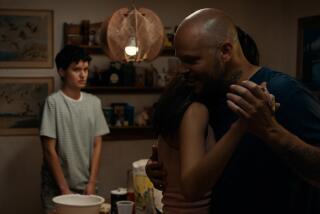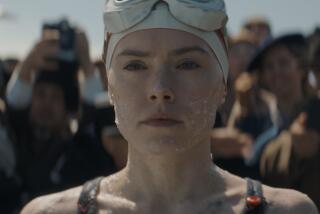Review: ‘Cloro’ is a deep, beautifully modulated Italian coming-of-age tale
- Share via
Marked by an economy of words but a depth of feeling, the Italian import “Cloro” proves an impressive feature debut for director Lamberto Sanfelice, who co-wrote this stirring coming-of-age drama with Elisa Amoruso.
Jenny (Sara Serraiocco) is a 17-year-old synchronized swimming competitor forced to move from her home in seaside Ostia to a remote mountain village after her mother dies and her father (Andrea Vergoni) suffers a nervous breakdown. Jenny’s anxious uncle (Giorgio Colangeli) ensconces Jenny, her catatonic dad and her antsy younger brother, Fabrizio (Anatol Sassi), in his spare cabin, leaving Jenny in charge of her fraught little family.
SIGN UP for the free Indie Focus movies newsletter >>
Despite a steely resourcefulness, Jenny is hardly OK with this setup, eager to return to Ostia in time for a major swim contest. Meanwhile, she gets a housekeeping job at the local inn, a modest ski resort ironically named the Hotel Splendor; enrolls Fabrizio in school, struggles to revive her blank father and attempts to keep up her swim training. But will she ever really leave the mountains?
Not a tremendous amount may happen in “Cloro” (Italian for “chlorine”), but much goes on emotionally, especially for the trapped, aching Jenny. An unlikely fling with the hotel’s mysterious groundskeeper (Ivan Franek) helps fill a void, but it feels like just another way for Jenny to mark time. Still, due in large part to Serraiocco’s deep, quietly grounded performance, it’s hard not to be drawn into her evocative journey. (The lovely actress evokes a youthful combination of Hilary Swank, Jennifer Garner and Anne Hathaway.)
Sanfelice moves the gentle action along with patient, observational takes, mixed in with more staccato, impressionistic imagery and bits of synchronized swimming footage. For some viewers, however, there may be a dearth of narrative context: How did Jenny’s mother die? What was her father like before? How did the resentful Jenny relate to him and Fabrizio in happier times?
But, as in the beautifully modulated marital drama “45 Years,” less can prove to be more. If we have to work a little harder to invest in “Cloro’s” transporting story, so be it. For serious filmgoers, it will be worth it.
More to Read
Only good movies
Get the Indie Focus newsletter, Mark Olsen's weekly guide to the world of cinema.
You may occasionally receive promotional content from the Los Angeles Times.










